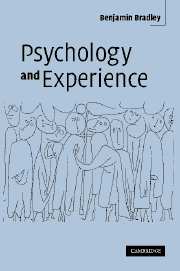Book contents
- Frontmatter
- Contents
- List of illustrations
- Preface
- Acknowledgements
- 1 Introduction
- 2 Learning from experience
- 3 From here to synchrony
- 4 What to make of coincidence
- 5 The topography of intersubjective space
- 6 The two axes of psychological explanation
- 7 Pictures of psychical change
- 8 Research among equals
- 9 Validating the curriculum
- 10 Conclusion
- List of references
- Index
10 - Conclusion
Published online by Cambridge University Press: 22 September 2009
- Frontmatter
- Contents
- List of illustrations
- Preface
- Acknowledgements
- 1 Introduction
- 2 Learning from experience
- 3 From here to synchrony
- 4 What to make of coincidence
- 5 The topography of intersubjective space
- 6 The two axes of psychological explanation
- 7 Pictures of psychical change
- 8 Research among equals
- 9 Validating the curriculum
- 10 Conclusion
- List of references
- Index
Summary
Rouse the dull ear, the hoodwink'd eye unbind,
And give to energy the public mind.
(Erasmus Darwin, 1803, The Temple of Nature or the Origin of Society, Canto IV, lines 277–8).This book has two main themes. One argues the need to reverse the traditional priorities of psychology, arguing that the discipline's primary goal must be ethical and political: the practical promotion of human welfare and social justice. It is this practical priority that should guide the subject's scientific activities, its aim to advance our understanding of the mind. And it is this priority that best justifies psychologists' need to base their knowledge of the psyche upon experience, particularly the experiences of others. This is my first theme, one that sets psychology apart from the ‘pure’ sciences that have for a century provided its models, and requires psychologists to do something other than mimic the ideals and methods of biology or physics when they set out the conceptual justification for their inquiries. Hence we arrive at the book's second theme, the need to reconsider the concept most fundamental to the development of a genuinely empirical psychology: experience. The fruit of this reconsideration has been a picture of the mind that markedly differs from the way the psyche is usually drawn in psychology and most common sense.
Psychologists have long held the view that their job is to unravel what ‘lies behind’ or ‘underpins’ everyday experience.
- Type
- Chapter
- Information
- Psychology and Experience , pp. 205 - 214Publisher: Cambridge University PressPrint publication year: 2005



